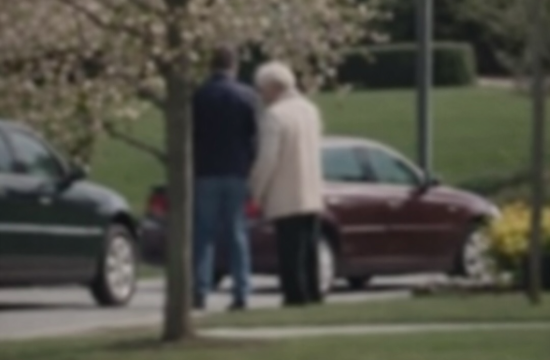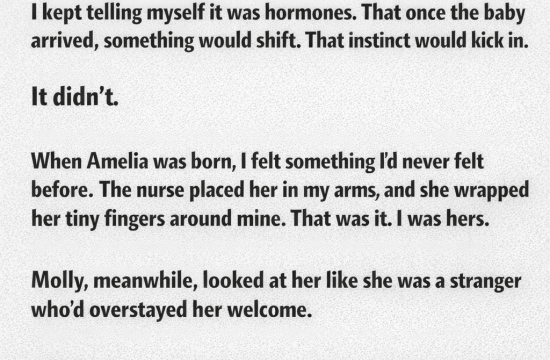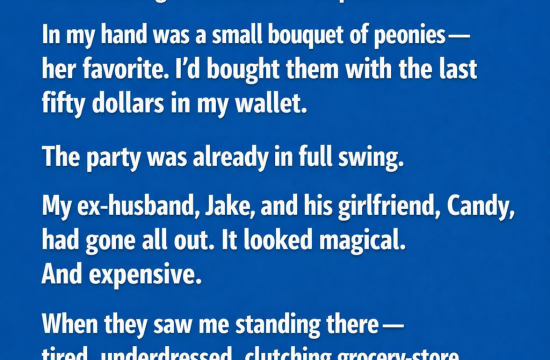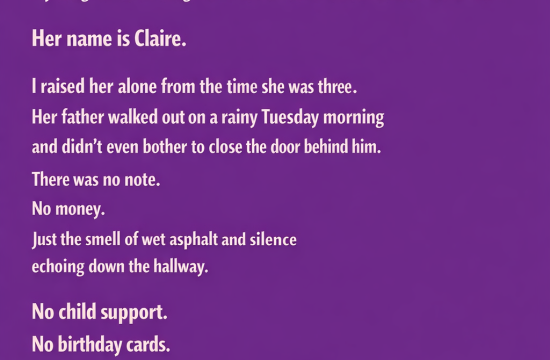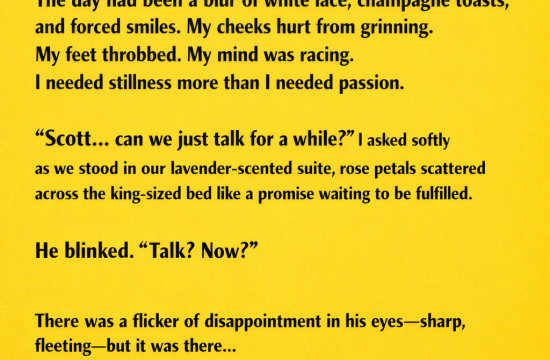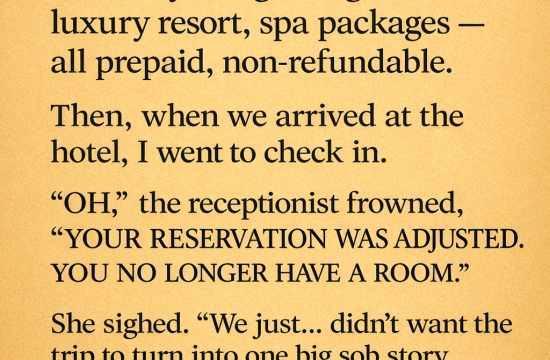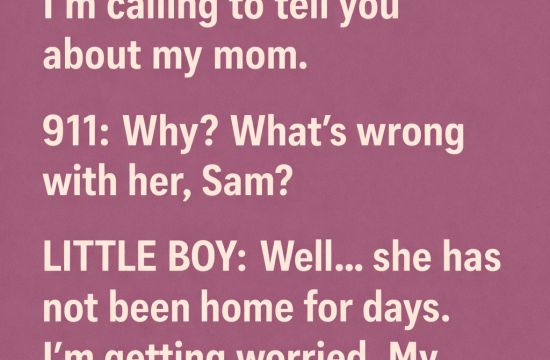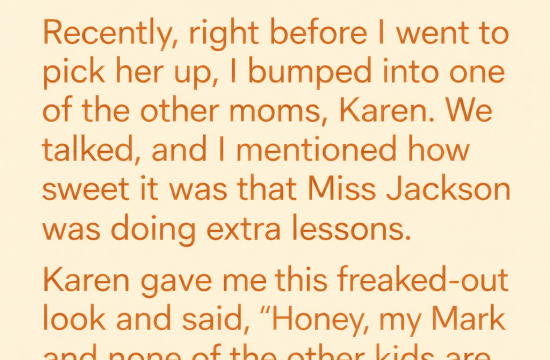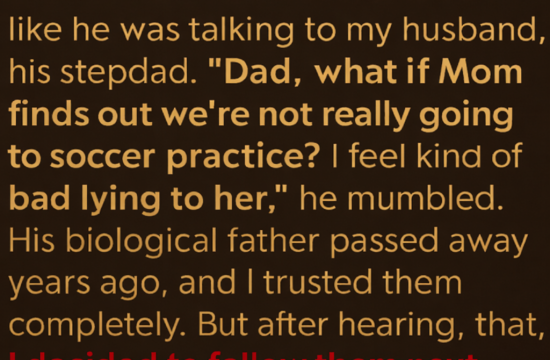My 10-year-old son, Caleb, from my first marriage, loves my wife, Sylvie. He calls her dad ‘Grandpa’ and is always kind to him, even when it’s clear that my father-in-law, Robert, doesn’t quite feel the same way about him. But recently, things took a darker turn.
One night, I found Caleb crying. Through his tears, he said, “Grandpa says I’m not really family. When you have a real baby, I’ll go live with my ‘real mom.’” My heart broke. I confronted Robert, but he just scoffed. Later, when I was taking Caleb to school, Robert snapped, “NOT THAT CAR. IT’S FOR THE REAL FAMILY. TAKE THE OLD ONE.”
That was it. I stepped close to him, my voice shaking, but I didn’t back down. “Robert, you are crossing a line you can’t uncross.” His smug expression faltered for a moment, but he recovered quickly, waving me off like I was a child throwing a tantrum.
I didn’t want to escalate things in front of Caleb, so I took him by the hand, led him to the old car, and drove him to school in silence. He kept glancing at me, his eyes asking if I still loved him. It broke my heart that a 10-year-old had to question something so fundamental.
That night, I told Sylvie everything. Her face went pale. She said she would talk to her father, but the next morning, she came back to me looking exhausted. “He refuses to apologize,” she admitted. “He says I’m overreacting and that he was just joking.” The word joking made my blood boil. What kind of joke makes a child cry himself to sleep?
I knew I couldn’t let this go. I called my lawyer friend, Terrell, and asked if there was anything I could do to protect Caleb from being bullied in his own home. Terrell sighed and said, “Honestly, man, your best bet is to talk to your wife. Either you two set clear boundaries with him, or you move out.”
Moving out felt like giving up. But staying silent felt just as bad. That evening, I told Sylvie I wanted Robert out of our house until he could accept Caleb. She looked stunned, then hurt, then defensive. “He’s my father!” she said, her voice cracking.
“And that’s my son,” I said firmly. “He needs to feel safe here.”
We spent days arguing. Every time we made progress, Robert would say something vile again, undoing everything. Once, he told Caleb, “I hope your dad doesn’t waste all his money on you before the real baby comes.” Caleb didn’t even know we were trying to have a baby. That night, he asked, “If you have a new baby, will you still love me?”
I hugged him tightly, his small body squirming against mine. “Nothing will ever stop me from loving you,” I whispered, though my heart was boiling inside. Robert was planting seeds of insecurity in a child who’d already been through enough with the divorce.
Finally, Sylvie agreed: Robert would move back to his own condo temporarily. We told him together. He looked at Sylvie, expecting her to take his side. But she didn’t. He turned red, called me an ungrateful freeloader, and stormed off with his suitcase.
For a while, things were peaceful. Caleb started smiling again. He’d race me up the stairs, tell me jokes, and his eyes were bright, not wary. Then, one Sunday, Robert showed up unannounced with a box of cookies. Caleb was excited—he thought Grandpa was here to make things right. But Robert pulled me aside and hissed, “I’m not here to apologize. I’m here to make sure you know you don’t belong.”
It felt like a knife to my chest. But instead of shouting, I kept my voice calm and said, “I hear you. But if you can’t respect my son, you’re not welcome here.”
Robert snorted. “This is Sylvie’s house. You can’t kick me out.”
Sylvie heard that from the kitchen and stepped in. “Actually, Dad, we own this house together. And you’re a guest.”
Robert’s mouth opened, but no words came out. He left again, but I knew he’d be back. He was the kind of man who had to win, even if it meant crushing a child’s spirit.
A week later, Sylvie found out she was pregnant. We were overjoyed, but also terrified. Would Robert’s hateful words become prophecy? Would he dote on the baby while treating Caleb like an outsider?
We decided we wouldn’t tell anyone about the pregnancy until we figured out how to protect our family. But life has a way of throwing curveballs. At dinner with Sylvie’s sister, Robert showed up uninvited. He walked in with a bottle of wine and saw Caleb on the couch, then loudly announced, “Well, it’s good you brought him. Let’s see if he can learn to behave before the real grandchild arrives.”
Everyone froze. Sylvie’s sister looked horrified. Caleb’s eyes went wide and filled with tears. I stood up so fast my chair clattered to the floor. I grabbed Robert by the arm and marched him outside. He was shocked—no one had ever stood up to him like that.
“You will not speak to my son like that ever again,” I said, my voice low. “You’ve made your feelings clear. But let me make mine clear: if you want any relationship with this family, you will treat both children the same.”
He laughed bitterly, said, “That’s not how family works,” and left. Sylvie was shaking when I returned. She said she felt like she was choosing between me and her dad, and it was tearing her apart.
I told her gently, “You don’t have to choose. You just have to set boundaries.”
She nodded, but I knew it wasn’t that simple for her. She’d been raised to believe Robert’s way was normal.
In the weeks that followed, Sylvie started therapy. She began to see how toxic Robert’s behavior was, not just for me, but for her, too. She asked him to meet with her therapist. He refused. That’s when something shifted in Sylvie. She told me she didn’t recognize the man she’d once admired as her dad.
A month later, we had a family dinner without Robert. Sylvie’s mom, Janine, who had divorced Robert years ago, came. She quietly told me that Robert had always been cruel—he’d called Sylvie’s older brother “a mistake” growing up. That brother had cut off all contact and moved across the country.
I realized Robert’s cruelty wasn’t about Caleb; it was about his need to control. That knowledge gave me a strange sense of peace. It wasn’t personal, but it was still unacceptable.
We decided to tell Caleb about the baby. He was excited but worried. “Does this mean I’m not enough?” he asked softly.
My heart shattered. “You’re more than enough,” I said. “The baby is going to be lucky to have you as a big brother.”
The pregnancy progressed, and we created new traditions—movie nights, pancake Sundays, bedtime stories. Caleb began to believe he was part of something permanent. But Robert kept calling, leaving voicemails saying things like, “Don’t let that boy near my grandchild.”
We stopped answering. When our daughter, Elodie, was born, we didn’t tell Robert right away. We focused on bonding as a family. Caleb was amazing with her—he helped with diapers, sang her lullabies, and even made silly faces that made her giggle.
One afternoon, Robert showed up on our doorstep. He demanded to see Elodie. I stepped outside and shut the door behind me. He glared at me, said, “I have a right to see my granddaughter.”
I took a deep breath. “You’ll see her when you can treat both children like family. Until then, you’re not welcome here.”
He sneered. “Sylvie will cave. She always does.”
But he was wrong. When Sylvie came outside, holding Elodie in her arms, she told him firmly, “Dad, I love you. But if you can’t love both of my children, you won’t see either of them.”
He looked stunned. I don’t think anyone had ever set a real boundary with him before.
He tried calling every day for a week. Each time, Sylvie calmly reminded him of the boundary. Finally, he stopped calling. Months went by. Our little family grew stronger. Caleb glowed with pride at school whenever he talked about his baby sister.
Then, on Elodie’s first birthday, Robert called. He sounded different—exhausted, small. He asked if he could come over and talk. I was skeptical, but Sylvie said everyone deserves a chance to change. So we agreed.
He arrived looking older, thinner. He started to cry as soon as he stepped inside. He told Caleb he was sorry. He admitted he’d been cruel, said he was afraid of being replaced and projected that fear onto a child. He asked if we could forgive him.
Caleb looked at me, eyes searching. I nodded gently. He hugged Robert. It wasn’t an instant fix, but it was a start.
Over the next year, Robert made real efforts. He attended family therapy with Sylvie. He started inviting Caleb to the park, just the two of them. Slowly, trust grew. By Elodie’s second birthday, Robert was a welcome guest in our home.
One evening, after we put the kids to bed, Robert stayed behind. He looked at me with tears in his eyes and said, “I was wrong about you. You’re a better father than I ever was.”
I didn’t know what to say. I just nodded. It wasn’t about winning. It was about healing.
Through everything, I learned that family isn’t about blood. It’s about love, patience, and standing up for each other, even when it’s hard. It’s about breaking cycles, so the next generation doesn’t have to carry old wounds.
If you’re in a situation where someone tries to make you or your children feel like they don’t belong, remember: you have the right—and responsibility—to protect your family. Love doesn’t divide; it multiplies.


